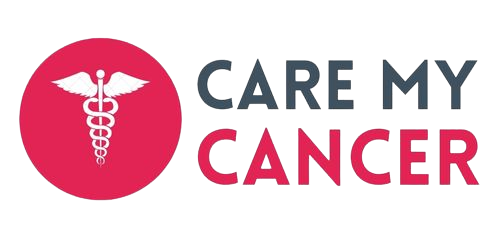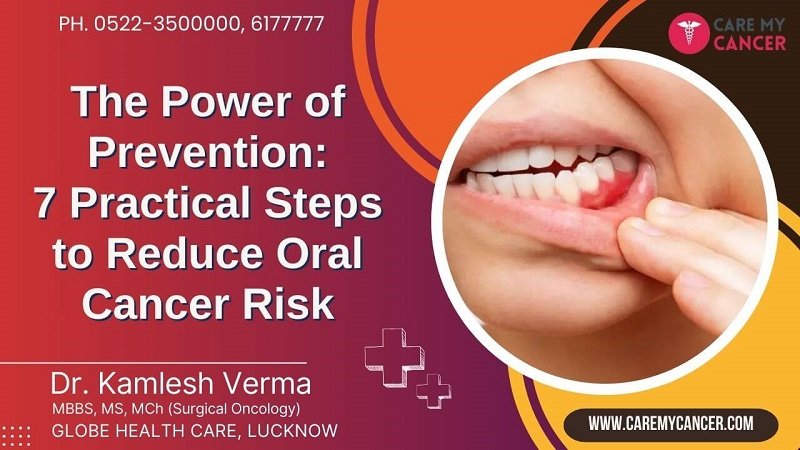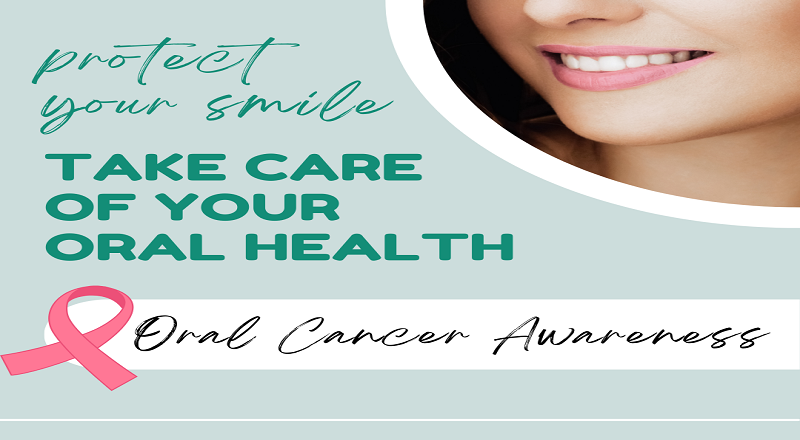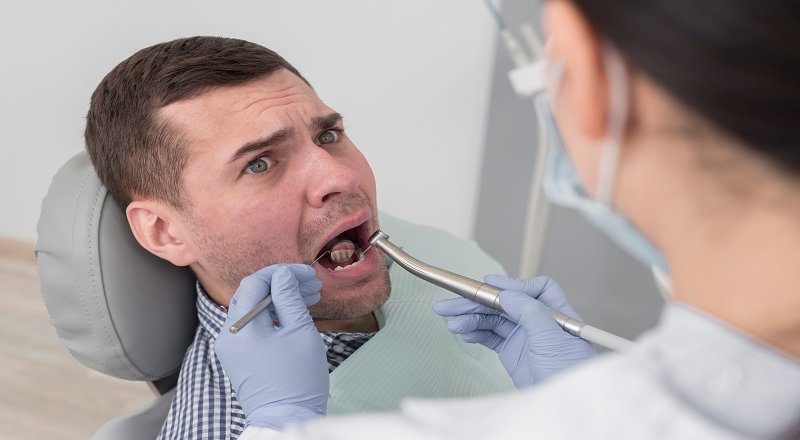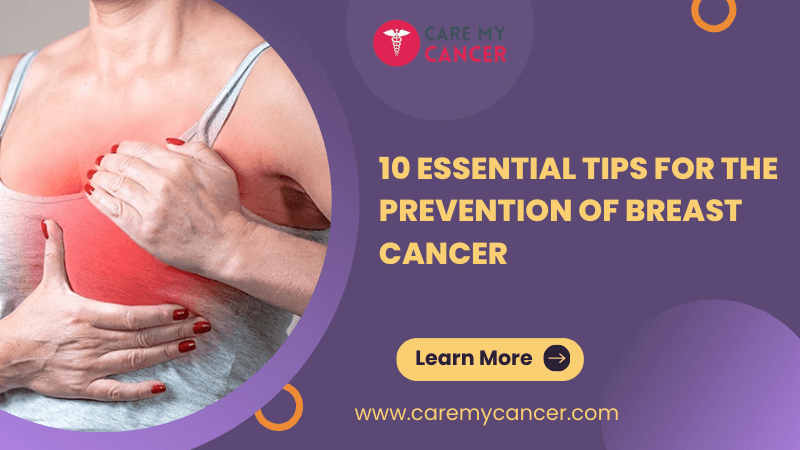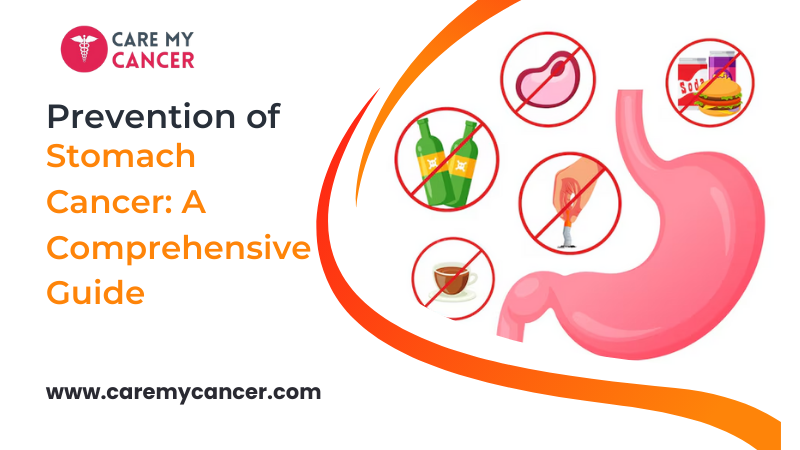Introduction Oral cancer is a serious health concern affecting millions worldwide. However, with proactive measures and awareness, it’s possible to reduce the risk significantly. In this article, Dr. Kamlesh Verma explores 7 practical steps individuals can take to prevent oral cancer and maintain optimal oral health. What is Oral Cancer? Oral cancer refers to cancerous growths in the mouth, including lips, tongue, cheeks, floor of the mouth, hard and soft palate, sinuses, and throat. It’s essential to understand the risk factors and symptoms associated with oral cancer for early detection and prevention. Identifying Risk Factors Certain factors increase the likelihood of developing oral cancer, including tobacco use, excessive alcohol consumption, prolonged sun exposure, human papillomavirus (HPV) infection, poor oral hygiene, and a compromised immune system. Recognizing Symptoms Early detection of oral cancer symptoms is crucial for effective treatment. Symptoms may include persistent mouth sores, swelling, lumps, difficulty swallowing or chewing, numbness, and chronic hoarseness. The Power of Prevention Oral Cancer Risk Prevention plays a pivotal role in reducing the incidence of oral cancer. By adopting healthy habits and lifestyle changes, individuals can significantly lower their risk of developing this disease. Regular Dental Check-ups Routine dental check-ups are essential for early detection and prevention of oral cancer. Dentists can perform thorough examinations, including oral cancer screenings, to detect any abnormalities or signs of cancerous growth. Tobacco and Alcohol Avoidance Tobacco and alcohol consumption are primary risk factors for oral cancer. Quitting smoking and limiting alcohol intake can significantly reduce the risk of developing oral cancer and improve overall health. Sun Protection Prolonged sun exposure can increase the risk of lip cancer. Wearing protective clothing, using lip balms with SPF, and avoiding excessive sun exposure can help prevent lip cancer and other sun-related oral health issues. Healthy Diet A balanced diet rich in fruits, vegetables, and whole grains can boost immunity and reduce the risk of oral cancer. Avoiding processed foods, sugary snacks, and excessive red meat consumption can promote oral health and overall well-being. Oral Hygiene Practices Maintaining good oral hygiene habits, such as regular brushing, flossing, and using mouthwash, can prevent oral health issues and reduce the risk of oral cancer. Practicing proper oral hygiene is essential for overall oral health and cancer prevention. HPV Vaccination Human papillomavirus (HPV) infection is a significant risk factor for oral cancer. Vaccination against HPV can reduce the risk of oral HPV infection and lower the chances of developing oral cancer. Regular Exercise Regular physical activity is essential for overall health and well-being, including oral health. Engaging in regular exercise can boost immunity, reduce inflammation, and lower the risk of developing various cancers, including oral cancer. FAQs (Frequently Asked Questions) What are the early signs of oral cancer? Early signs of oral cancer may include persistent mouth sores, swelling, lumps, difficulty swallowing or chewing, numbness, and chronic hoarseness. How often should I visit the dentist for oral cancer screenings? It’s recommended to visit the dentist at least twice a year for routine check-ups, including oral cancer screenings. Can oral cancer be prevented? While not all cases of oral cancer can be prevented, adopting healthy habits such as avoiding tobacco and alcohol, maintaining good oral hygiene, and following a balanced diet can significantly reduce the risk. Is oral cancer curable if detected early? Yes, oral cancer is highly treatable if detected early. Early diagnosis and prompt treatment can significantly improve outcomes and increase the chances of survival. Is HPV vaccination necessary for oral cancer prevention? HPV vaccination is recommended as a preventive measure against certain strains of HPV that are associated with oral cancer. Vaccination can lower the risk of oral HPV infection and reduce the likelihood of developing oral cancer. Are there any lifestyle changes I can make to reduce my risk of oral cancer? Yes, adopting a healthy lifestyle, including quitting smoking, limiting alcohol consumption, maintaining good oral hygiene, eating a balanced diet, and staying physically active, can help reduce the risk of oral cancer. Conclusion Prevention is key when it comes to reducing the risk of oral cancer. By incorporating simple lifestyle changes, regular screenings, and healthy habits, individuals can significantly lower their risk and maintain optimal oral health. Remember, early detection and proactive measures are crucial for preventing oral cancer and ensuring long-term well-being.
Empowering Oral Cancer Awareness: Advocacy, Campaigns, and Fundraising
Introduction As a powerful enemy, oral cancer requires our combined attention. A powerful tool against its cunning advancements is awareness. In this investigation, we explore the complex field of oral cancer awareness, including its campaigns, the importance of a dedicated month, advocacy opportunities, and the critical role that money plays in advancing oral cancer research. Oral Cancer Awareness Campaigns Awareness efforts on oral cancer are more than just means of disseminating information; they are active agents of change. To reach a range of audiences, these programmes carefully make use of a variety of channels. These programmes actively support early detection and debunk common misconceptions by emphasising the value of routine tests, comprehending risk factors, and identifying symptoms. By taking part in or lending support to these efforts, one may guarantee that the important message is widely understood, turning individual awareness into a group movement for preventative action. Oral Cancer Awareness Month Setting aside a particular month to raise awareness of oral cancer maximises the effect of our combined efforts. Many organisations, medical experts, and ardent supporters come together to spread the word during this committed time. Increased public awareness during Oral Cancer Awareness Month acts as a spark for community involvement, educational activities, and the broad distribution of important information. This targeted strategy makes sure that more people are aware of how important early detection and prevention of oral cancer are. Getting Involved in Oral Cancer Advocacy Beyond awareness is the field of advocacy, which is a larger-scale force for change. People may actively support projects that prioritise oral health education, work with local health organisations, and take part in awareness activities to raise knowledge of oral cancer. By advocating for preventative measures, influencing policy choices, and making sure that oral cancer stays a top priority on the public health agenda, advocates become change agents in their communities. Fundraising for Oral Cancer Research Fundraising initiatives provide financial assistance for the search for viable therapies and, eventually, a cure for oral cancer. Whether via planned events, business alliances, or individual endeavours, fundraising efforts generate vital funds for cutting-edge research, clinical trials, and programmes to assist individuals impacted. These donations directly support the development of new treatment options, which enhances the prognosis for those with oral cancer. By taking part in fundraising events, people become essential players in the ongoing fight against this difficult illness, advancing research and providing comfort to those who are impacted. Empowering Communities Through Knowledge The combination of campaigns, lobbying, fundraising, and dedicated months is what gives oral cancer awareness its impact. People may actively participate in the ongoing battle against oral cancer by increasing understanding and encouraging community involvement. This will assist research and improve results for people who are impacted by this difficult disease. Building Bridges Through Community Involvement Community engagement is essential for raising awareness of oral cancer, as it goes beyond individual efforts. Involving local populations in educational seminars, awareness campaigns, and screening events spreads awareness and alertness. The reach of awareness campaigns is increased by forming alliances with educational institutions, medical facilities, and community centres. This guarantees that oral cancer education is incorporated into community health programmes. The Impact of Personal Stories Providing personal accounts of resiliency and survival can help spread awareness of mouth cancer. Those who have had oral cancer frequently grow into influential advocates by sharing their own stories. These stories humanise the illness by illuminating the difficulties encountered, stressing the value of early discovery, and highlighting the optimism that results from effective care. These kinds of tales act as motivation, urging people to give oral health first priority and get treatment as soon as possible. Educational Initiatives for Prevention The first step in preventing oral cancer is education. A culture of prevention is promoted by the inclusion of dental health education in school curricula, workplace wellness initiatives, and community health programmes. Through highlighting the significance of lifestyle variables like quitting smoking and getting regular dental checkups, educational programmes enable people to actively lower their risk. Campaigns for education can also combat misunderstandings and promote informed decision-making by addressing preconceptions about oral cancer. The Role of Technology in Awareness Technology has been a powerful ally in raising awareness about oral cancer in the digital era. Real-time interaction with a variety of audiences is made possible by leveraging social media platforms, webinars, and internet resources. An ever-changing and easily navigable awareness environment is facilitated by interactive marketing, virtual events, and educational online series. In addition to expanding the scope of awareness campaigns, technology makes international cooperation in the fight against oral cancer easier. Sustaining Momentum Beyond Awareness Periods While targeted campaigns and months are important for stepping up efforts, maintaining momentum after these times is just as important. Oral cancer is kept in the forefront of public awareness by establishing year-round activities such frequent community health clinics, continuing education programmes, and ongoing fundraising efforts. Through cultivating an ongoing dedication to consciousness, societies may strive towards enduring prevention and early identification. Conclusion In conclusion, raising awareness of oral cancer is a complex task that benefits from teamwork. We can strengthen our efforts against this difficult disease by involving communities, sharing human stories, focusing on prevention via education, utilising technology, and maintaining momentum. By working together, we can raise awareness and effect real change that will improve people’s lives all across the world and lessen the effects of oral cancer.
Guarding Your Oral Health: Effective Strategies to Prevent Oral Cancer
Introduction Within the broad field of healthcare, the proverb “prevention is better than cure” holds significant resonance. This adage is especially applicable to oral cancer, a serious condition that can be greatly reduced with early intervention. We will go deeper into the main methods for preventing oral cancer in this extensive guide, emphasising the significance of oral cleanliness, lifestyle decisions, and routine dental exams. You may strengthen your oral health and dramatically lower your risk of oral cancer by adopting these practises into your everyday routine. 1. Importance of Oral Hygiene Any effective oral health routine is based on good oral hygiene. Knowing the subtle differences between brushing, flossing, and using antimicrobial mouthwash helps enhance the benefits of these dental hygiene routines. Frequent brushing—ideally twice a day—helps get rid of plaque, which is a bacterial film that sticks to teeth. Flossing every day ensures a complete cleaning by getting into the spaces between teeth that your toothbrush might miss. Rinsing with an antiseptic mouthwash encourages a healthy dental environment and aids in the removal of microorganisms. By following these procedures regularly, you can make your mouth less of a breeding ground for the circumstances that can cause oral cancer. 2. Avoiding Tobacco and Alcohol Alcohol abuse and tobacco use are two of the main risk factors for oral cancer. The compounds found in tobacco can seriously harm oral cells’ DNA, which fosters an environment that is favourable for the growth of cancer. Thus, abstaining from using tobacco products is one of the most effective actions you can take to prevent oral cancer. Furthermore, the risk of oral cancer is considerably decreased by moderation in alcohol consumption. These lifestyle adjustments enhance your general wellbeing in addition to having a good effect on your oral health. 3. HPV Vaccination and Oral Cancer Oral cancer has been linked to the human papillomavirus (HPV) as a substantial risk factor. Nonetheless, immunisation against particular HPV strains is a preventative step to mitigate this risk. For younger people in particular, this vaccination is essential since it protects against mouth cancer as well as other malignancies linked to HPV. A proactive measure in preventing mouth cancer is to speak with your healthcare professional about the HPV vaccine and its possible advantages for your general health. 4. Healthy Lifestyle Habits Living a healthy lifestyle is a comprehensive strategy that promotes general health and helps avoid oral cancer. Essential nutrients and antioxidants included in a balanced diet high in fruits and vegetables help the body’s natural defences against cancer. Other healthy lifestyle practises that support oral health and help prevent cancer include eating a balanced diet, exercising frequently, and drinking enough water. Eating a range of fruits and vegetables in your diet guarantees that you are getting the vitamins and minerals that your body needs to stay healthy. These foods’ antioxidants also aid in the elimination of dangerous free radicals, which may stop the growth of malignant cells. Reducing the incidence of multiple malignancies, including oral cancer, has been associated with maintaining a healthy weight and participating in regular physical activity. Frequent exercise supports healthy body functions, strengthens the immune system, and improves general well-being. Although sometimes disregarded, proper hydration is essential for dental health. Saliva is produced with the aid of water and is essential for keeping the mouth healthy. Saliva aids in mouth cleaning, acid neutralisation, and preventing the growth of dangerous microorganisms. 5. Regular Dental Check-ups A strict personal hygiene regimen is necessary, but it should be supplemented by routine dental examinations. During normal examinations, dentists are trained to look for early indicators of oral cancer. These experts are capable of seeing anomalies or questionable signs that might go missed during ordinary dental care. Frequent dental exams help in the early detection of other oral health problems in addition to preventing oral cancer. In addition to doing comprehensive examinations and screenings for oral cancer, dentists may offer insightful advice on preserving the best possible oral health. Conclusion Making wise decisions and taking preventative action can help achieve the aim of preventing oral cancer, which is not an insurmountable one. You may greatly lower your risk of oral cancer by making good oral hygiene a priority, giving up tobacco and excessive drinking, thinking about getting an HPV vaccination, leading a healthy lifestyle, and making frequent dental checkups. Your general well-being is closely linked to your oral health. Adopting these preventive measures will improve your overall health while strengthening your defences against oral cancer. Recall that awareness and action are the first steps in prevention. Take control of your dental health now to avoid cancer in the future. By using these all-inclusive techniques, you enable yourself to live a life of maximum oral and general health as well as to prevent oral cancer.
Treatment Options for Oral Cancer: A Comprehensive Guide
Introduction Oral cancer is a difficult and sometimes fatal disease that affects the lips, tongue, gums, and throat, among other regions of the mouth. In order to improve patient outcomes and quality of life, effective treatment is essential. The available treatment options for oral cancer will be discussed in this blog, including immunotherapy, targeted therapy, chemotherapy, radiation therapy, and surgery. When fighting oral cancer, it is critical for patients and medical practitioners to be aware of these choices. Surgery for Oral Cancer One of the main treatments for oral cancer is surgery, which is frequently used to remove the tumour together with the surrounding tissues. The location and severity of the malignancy determine the sort of surgery that is needed. The following are typical oral cancer surgery procedures: Radiation Therapy for Oral Cancer High-energy beams, such protons or X-rays, are used in radiation therapy to target and kill cancer cells. It is frequently used as the main treatment for oral cancer or in combination with surgery. Two primary categories of radiation therapy exist: Chemotherapy for Oral Cancer Drugs are used in chemotherapy to either kill or stop the growth of cancer cells. It can be injected orally, and it is frequently used in conjunction with other therapies. Chemotherapy may be used in the following ways in cases of oral cancer: Targeted Therapy for Oral Cancer One type of treatment called targeted therapy focuses on the chemicals that are responsible for the proliferation and metastasis of cancer cells. When specific genetic or molecular abnormalities are present in the malignancy, it is frequently used. Oral cancer targeted therapy could consist of: Immunotherapy for Oral Cancer A cutting-edge strategy called immunotherapy uses the body’s immune system to combat cancer. It has demonstrated potential in the treatment of several cancers, including oral cancer. The following are the main forms of immunotherapy for oral cancer: Conclusion Treatment for oral cancer must take a multifaceted strategy due to its complexity and difficulty. The cancer’s stage, the patient’s general health, and the tumor’s unique properties all influence the therapy modalities that are selected. In the treatment of oral cancer, surgery is still the mainstay and is frequently paired with chemotherapy and/or radiation therapy. Promising strategies include targeted therapy and immunotherapy, especially in cases that are advanced or when certain genetic or molecular abnormalities are present. A multidisciplinary team of medical specialists develops individualised treatment plans, which are crucial for enhancing patient results and guaranteeing the highest standard of living. Effective management of oral cancer requires regular check-ups, early detection, and open contact with healthcare practitioners. Patients and their families can make more informed decisions and confidently tackle the challenges of oral cancer by being aware of the available treatment options.
Diagnosis and Staging of Oral Cancer: Navigating the Path to Awareness
The potentially fatal condition of oral cancer emphasizes the significance of early detection and precise staging for efficient therapy. This blog explores the thorough procedure for identifying oral cancer, highlighting the use of biopsies, staging, and imaging studies. People can empower themselves with knowledge and take proactive efforts in their journey towards oral health and well being by learning these fundamental stages. Understanding the nuances of Diagnosis and Staging of Oral Cancer is essential for informed decisions and improved outcomes Oral Cancer Diagnosis Process: A multifaceted strategy is used to diagnose oral cancer, which starts with thorough clinical evaluations and research. Professionals from the dental and medical fields work together to ensure a complete assessment of any indications and symptoms. In general, the procedure goes as follows: Medical History and Physical Examination: Health care professionals collect thorough medical histories and do thorough physical examinations, concentrating on the mouth, throat, and neck areas. Professionals create the groundwork for additional investigations by comprehending the patient’s medical history and assessing the physical condition. Oral Examination: Dental professionals conduct meticulous oral examinations, checking for unusual growths, sores, discolorations, or other abnormalities. This step is pivotal in identifying early warning signs that might otherwise go unnoticed. Biopsy for Oral Cancer: A pivotal step in the diagnostic process is a biopsy, which involves the removal of a tissue sample for laboratory analysis. There are different types of biopsies, including: The results of a biopsy give crucial information about the tissue’s makeup, confirming the presence of cancer and assisting in choosing the best course of action. The exact characteristics of the suspicious location determine the sort of biopsy that will be done. Staging of Oral Cancer: Understanding the degree of oral cancer and making treatment plans require staging. The tumor’s size, degree of invasion, involvement of neighbouring lymph nodes, and potential spread to distant regions of the body are all taken into account throughout the staging procedure. Oral cancer is categorised into stages 0 through IV according to the TNM classification, which is often employed. Medical experts use staging to help them choose the best course of action and forecast outcomes. Imaging Tests for Oral Cancer: Imaging tests are important for identifying and staging oral cancer. They assist in the design of treatments and offer comprehensive insights into the severity of the disease. There are various imaging modalities used: In conclusion, a thorough strategy combining clinical evaluations, biopsies, and imaging studies is required for the diagnosis and staging of oral cancer. The breadth and characteristics of the disease are accurately identified through this approach, enabling customised treatment regimens. Individuals can start down a path towards timely treatments, better outcomes, and greater quality of life by following through these steps. It is essential to speak with knowledgeable medical professionals who focus on the detection and management of oral cancer. Oral cancer management is a specialty of eminent Lucknow best oncologist Dr Kamlesh Verma. His advice and insights can be extremely helpful in navigating the complexity of diagnosis and staging, which will eventually result in the best possible treatment outcomes.
Symptoms and Early Detection of Oral Cancer: A Vital Guide
The early discovery of oral cancer, also known as mouth cancer, is essential for effective treatment and better prognosis. This blog seeks to offer a comprehensive explanation of the typical oral cancer symptoms, stress the significance of early identification, talk about mouth cancer screening, and offer insights into self-examination methods. Investigating each facet will enable people to engage proactively in the fight against this illness. Common Oral Cancer Symptoms: There are several signs that oral cancer can show, some of which are obvious. These consist of: Importance of Early Detection: Early identification of oral cancer is crucial for effective treatment, hence it is important. Early diagnosis greatly improves the likelihood of successful treatment and successful outcomes. More choices for less intrusive therapies become available the earlier oral cancer is discovered, potentially saving patients from more invasive operations and enhancing their quality of life. Oral Cancer Screening: For people who are at higher risk, routine mouth cancer screenings are crucial. During routine checkups, dental practitioners are taught to look for possible symptoms of oral cancer. In order to find any anomalies, these screenings require a comprehensive examination of the mouth, gums, tongue, and throat. To achieve a prompt diagnosis and suitable course of therapy, additional tests and assessments are advised if any worrisome indicators are found. Self-Examination for Oral Cancer: Self-examination can be very important in early detection, in addition to expert screenings, which are essential. Here’s how to conduct a simple mouth cancer self-examination: Signs of Oral Cancer: In addition to the above listed typical symptoms, further indications of oral cancer may include: In conclusion, it is critical to understand the signs and symptoms of oral cancer, the value of early detection, and how to conduct self-examinations in order to effectively treat this disease. A thorough approach to oral health includes self-examinations and routine dental checkups. Remember, it’s very important to see a doctor right away if you experience any chronic symptoms or strange changes in your dental health. Consider speaking with dental professionals like Dr. Kamlesh Verma, best oncologist in Lucknow, for professional oral cancer screenings and advice. The knowledge of Dr. Verma can be quite helpful in achieving the best possible dental health and general wellbeing.
Understanding Oral Cancer: Causes, Risk Factors, Prevention, and Statistics
A dangerous disease that affects thousands of individuals worldwide, oral cancer is also known as mouth cancer or oral cavity carcinoma. Cells in the tissues of the mouth, lips, tongue, or throat grow abnormally with this condition. The key to fighting this illness is early discovery and knowledge of the causes, risk factors, and prevention methods. Understanding oral cancer can be a lifesaver. Oral Cancer Overview: A kind of head and neck cancer, oral cancer can affect the lips, tongue, cheeks, throat, and other areas of the mouth. It typically begins as a little, painless sore or growth that is sometimes difficult to see at first. As it worsens, symptoms including recurrent mouth ulcers, trouble swallowing or chewing, and voice abnormalities may manifest. Oral Cancer Causes: The exact origin of oral cancer is multifaceted and frequently results from a buildup of genetic abnormalities that induce unchecked cell development. A few elements have been recognised as potential triggers for these changes, despite the fact that the exact mechanisms are not entirely understood. Use of tobacco products, such as cigarettes, cigars, and smokeless tobacco, is one of the main causes of mouth cancer. The DNA in oral cells can be damaged by the chemicals in tobacco, increasing the likelihood that cancer will form. Another important concern is excessive alcohol intake, especially when mixed with tobacco use. Understanding Oral Cancer Risk Factors: People can make educated judgments regarding their lifestyle choices if they are aware of the risk factors for mouth cancer. Oral cancer risk is affected by a number of factors, including: It’s crucial to remember that anyone can acquire oral cancer even in the absence of certain risk factors, even though they offer useful insights. As a result, periodic dental exams and self-examinations are essential for early detection and prevention. Oral Cancer Statistics: With millions of instances being discovered each year, oral cancer is a major global health concern. An estimated 53,000 new instances of oral and throat cancer will be discovered in the United States alone each year. Tragically, oral cancer mortality rates continue to be high, largely as a result of late-stage detection. Early diagnosis greatly increases the likelihood of effective therapy and long-term survival. This emphasizes how crucial it is to spread knowledge about oral cancer, its risk factors, and the value of routine oral health exams. Oral Cancer Prevention: The key to lowering the incidence of oral cancer is prevention. Individuals can drastically reduce their risk of contracting this deadly disease by being proactive: In conclusion, enhancing oral health and lowering the prevalence of this disease depend much on knowing oral cancer, its causes, risk factors, and prevention techniques. You may take important actions to avoid oral cancer and ensure a healthier future by adopting a healthy lifestyle, being proactive in monitoring your oral health, and getting regular dental care. Understanding oral cancer can be a lifesaver. For personalized guidance on oral health and cancer prevention, consultations with healthcare professionals like Dr. Kamlesh Verma, the best oncologist in Lucknow, can provide valuable insights and support. Dr. Kamlesh Verma’s expertise can play a crucial role in ensuring optimal oral health, as well as addressing any concerns related to cancer prevention and overall well-being.
